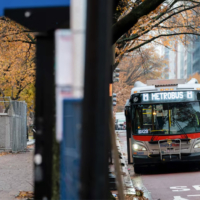Seeking Public Housing Solutions for Japan in Los Angeles Urban planning alumna Kimiko Shiki returns to UCLA Luskin as a visiting scholar
By Lauren Hiller
Housing choice vouchers in the United States allow low-income families to move into neighborhoods with greater opportunities and resources. But these vouchers may provide opportunities beyond housing — access to employment, transportation and welfare programs that can improve general economic conditions.
As a visiting scholar this year at the UCLA Lewis Center for Regional Policy Studies, UCLA Luskin alumna Kimiko Shiki MA UP ’01, Ph.D. ’08 will investigate the relationship between housing choice vouchers, residential mobility and opportunities in Los Angeles. The associate professor of policy science at Ritsumeikan University in Osaka, Japan, specializes in the housing-location decisions of low-income households and their spatial access to employment opportunities, transportation and welfare services.
Shiki’s doctoral research at UCLA focused on why low-income households are concentrated in dense communities in U.S. cities. At the Lewis Center, Shiki said she plans to use Department of Housing and Urban Development administrative data to analyze low-income residential mobility in Los Angeles from housing choice voucher recipients.
Unlike in the United States, public housing in Japan is often located in the suburbs because of the scale and cost of construction, but transportation access and employment opportunities are more limited outside an urban core.
“Suburban locations can be good for housing quality,” Shiki said. “But if you want to try out other jobs or use other childcare services, it may not work in the suburbs.”
According to her study in Kyoto, Japan, low-income families tend to apply for public housing near their residences in order to maintain their current jobs and local social support systems, Shiki said. Because public housing supply is highly limited geographically, as well as numerically, this means that many low-income families cannot choose to live in public housing.
Without a rental subsidy program, like housing choice vouchers, these households instead turn to a private market that has little economic support, Shiki said. Her research seeks to show policymakers that affordability is not the only consideration that low-income households must weigh when searching for housing.
“Urban poor often experience a lot of migration and mobility, and their needs for residential location change. They often have to move to other areas to find better opportunities,” Shiki said. Public housing doesn’t provide resources for various needs, she said, “but the private market might give them more options for residential location.”
Shiki said she understands the benefits of public housing and hopes her research will show how Japan can augment its services.









Leave a Reply
Want to join the discussion?Feel free to contribute!